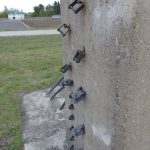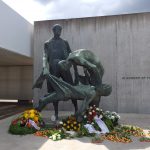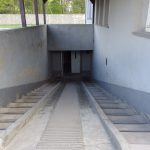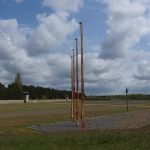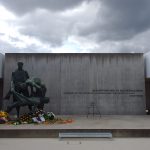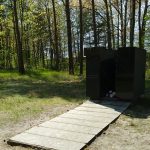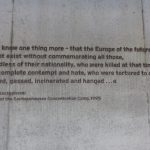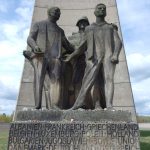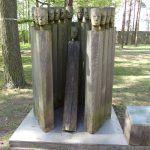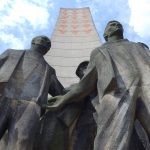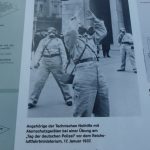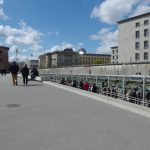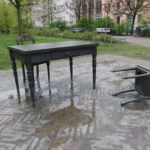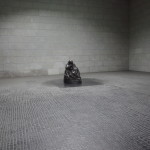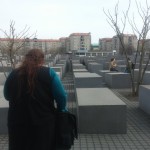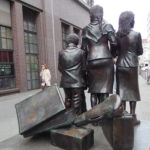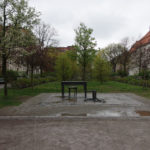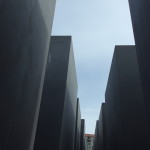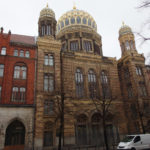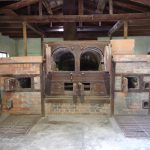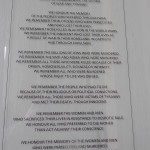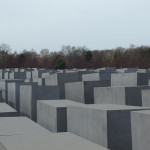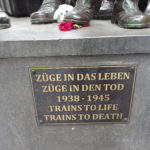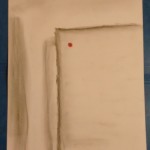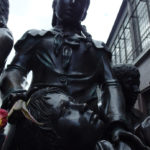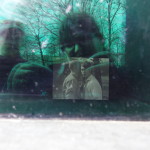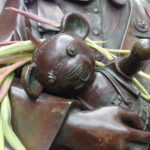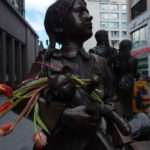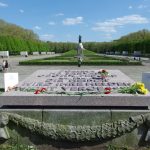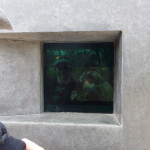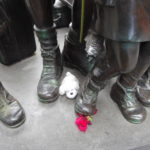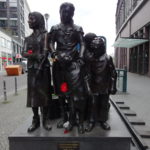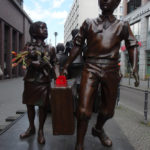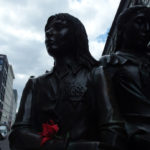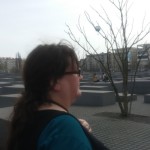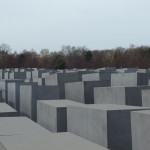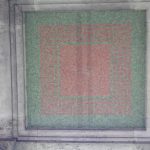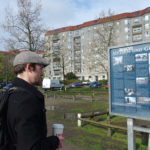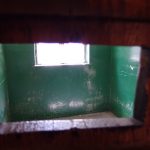I opted to do this alone. I don’t really have anything I could possibly say to make the gravity and horror of a concentration camp make sense to anyone who hasn’t been to one. It doesn’t even make sense once you’ve been to one. This place is an unholy despair factory designed by sadistic brilliance. And right now I am sitting at a mass grave, in pleasant neighborhood listening to the autobahn and the blackbirds whir and chirp in the background. They built the modern police training barracks next to the camp. As a warning. This is what happens when authority goes unchecked and brutality takes the place of protection. This is a terrible place filled with the memories of terrible acts that illustrate how far that can go in the blink of an eye.
This trip to the concentration camp has left me feeling pretty fragile inside. It was so much worse than I imagined it would be. It isn’t the same as reading about it. It’s so much more visceral standing where tens of thousands experienced cruelty and pain none of us will ever know. I genuinely loathe the idea of people suffering such unimaginable atrocities, to the point where I can’t shake it. I always assumed this was normal, but after watching people runaround the camp with their selfie sticks and then talk about where to go for lunch on the bus afterward, I don’t know anymore. I felt sick and horrible the whole time, like there was a stench in the air but you couldn’t smell it. I had to force myself to take pictures because I knew I would regret not documenting it. I sat for a really long time at the mass grave and didn’t even realize there were tears in my eyes. Is it stupid to get that emotionally worked up about anonymous people who died 70 years ago? I don’t think so. Someone has to mourn them, and anyone who remembers them is most likely dead by now.
Tag Archives: war
Gallery: Topography of Terror Museum
This museum is located at the site of the former offices of the Gestapo and the SS. The building is as sparse and minimalist as possible. Everything about it screams “THIS IS NOT A MONUMENT”. The grounds themselves are surrounded by a field of jagged stone, as if the earth here has been scorched and salted so nothing will ever grow again. I did not take any photos inside, although they were allowed. It didn’t feel like anything I wanted photographs of. Mostly black and white photos and text, the museum traces the history or the Gestapo and the SS, and by extension the Nazi regime. I found this museum interesting because the symbolism of the place seemed to summarize the attitude the German people have toward the Holocaust and the war. I did not realize how romanticized it was in the States until I came here. We have turned it into a nightmarish fairy tale and the Nazis have become faceless drones that can be killed in video games or film without any remorse. The German people live with the reality of their past every single day. It surrounds them, and is glaring in its confrontation. Rather than feeling guilty or complaining about how they shouldn’t be forced to deal with the deeds of their ancestors (as we so often hear in America), the Germans have taken these reminders as an inspiration to try and be better, to refuse to regress. I found it interesting that during my visit everyone back home kept asking me about the refugees with fear and horror and everyone in Germany asked me about Trump in the same way.
America about Germany: “Why didn’t the Germans stand up to Hitler? They are all guilty because they didn’t make a stand! If everyone had resisted, he wouldn’t have gained power”
America about America: “These people shouldn’t protest Trump, they are just giving him what he wants.”
Germany about America: “Seriously? SERIOUSLY?? *turns to Russia* Were they not watching before??”
Russia: *shrugs* “Don’t look at us. We’ve got Putin now.”
Theme: The War
The War is ever-present here, which should come as no surprise to most people. From monuments to memorials to concentration camps to bullet holes in the walls, the scars of battle, death, and tyranny are everywhere. One of the most moving symbols of the war are the “Stolpersteine”, or “stumbling stones”. They are small brass plates placed in the sidewalks among the cobblestones in front of houses and buildings with the names of Jewish people who had lived there before before being murdered by the Nazis.
They are everywhere.
Once you start to notice them, the magnitude of the Holocaust begins to come into focus. Entire families. Everywhere you walk. Where you buy your groceries. At the pharmacy on the corner. At the tram stop. Everywhere.
However, one of the saddest things I have seen is a photo of a dead German soldier, laying in the street during the Battle of Berlin.

Being here during the 71st anniversary of the turning point of the war has been an exercise in empathy. Perhaps because while I had considered the millions of Jews, Russians, Roma, LGBT, and other groups murdered by the Nazis, I hadn’t really though of the German people as victims before. Understanding that we have turned “German” in to “Nazi” and “Nazi” into “disposable fictional enemy” has made me understand better how easily we marginalize people we know nothing about. Learning about the people who opposed the Nazis and paid for it with their lives was eye opening. I suppose I knew on some level this was the case, but when you realize that the entire nation paid for the deeds of a powerful few, it breaks your heart. With everything going on in America right now you get a sense of the helplessness and rage so many Germans must have felt as the monsters took over their homeland.
I look at that dead young man and I don’t see a Nazi. I see a boy who, at this point in the war, was in all likelihood conscripted into serving on the threat of death. And now he’s gone, giving his life in a lost cause to feed the horrible dreams of a megalomaniacal fascist state. Making anyone a caricature makes it easy to dehumanize them, easy to kill them, and easy to lose your own humanity in the process.


